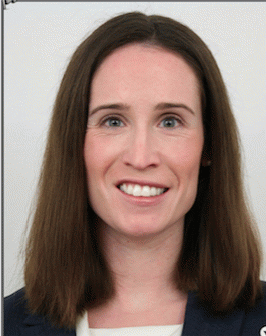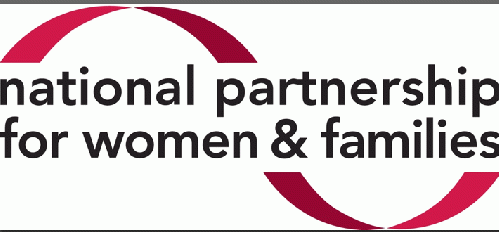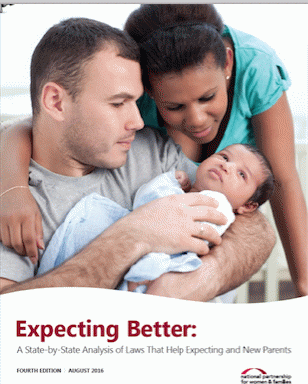My guest today is Sarah Fleisch Fink, director of workplace policy and senior counsel at the National Partnership for Women & Families .
Joan Brunwasser: Welcome to OpEdNews, Sarah. Many of our readers are not familiar with your organization. Can you tell us a bit about it, please?
Sarah Fleisch Fink: The National Partnership for Women & Families is a nonprofit, nonpartisan 501(c)(3) organization located in Washington, D.C. For 45 years, we have fought for every major federal policy advance that has helped women and families.
Today, we promote fairness in the workplace, reproductive health and rights, access to quality, affordable health care, and policies that help women and men meet the dual demands of their jobs and families. Our goal is to create a society that is fair and just, where nobody has to experience discrimination, all workplaces are family friendly, and no family is without quality, affordable health care and real economic security.
JB: I never heard of your organization before now but I support your goals. They align well with my own. How're you coming on accomplishing them? And what're you working on currently?
SFF: Over the past several years, since the last edition of our Expecting Better report was released in 2014, we have seen some states make real progress in advancing policies that help expecting and new parents. Eleven states and the District of Columbia improved their grades as the result of implementing new laws, including New York, which became the fourth state with a paid family leave program; D.C., which passed paid family leave for its own government employees; California, Massachusetts, Oregon and Vermont, which passed paid sick days laws; and a number of states that passed pregnancy accommodation laws.
At the same time, too many states are not doing enough for working families, including the 12 states that do not have a single protection beyond what federal law provides to help expecting and new parents. Currently, at the National Partnership for Women & Families, we are working at the state and federal levels to provide greater protections to working families. At the federal level, we are working in coalition to pass the Family And Medical Insurance Leave (FAMILY) Act, to provide paid family and medical leave; the Healthy Families Act, to guarantee workers access to earn paid sick days; and the Pregnant Workers Fairness Act, to guarantee pregnant workers who need them reasonable workplace accommodations so they can continue working throughout their pregnancies.
JB: Give us some context, please. How do we stack up with other countries in terms of these policies?
SFF: We do not compare well to other countries when it comes to policies, like paid family and medical leave, that help expecting and new parents. The United States is one of only a few countries among the 185 surveyed by the International Labor Organization that do not guarantee paid leave: 183 other nations guarantee paid maternity leave; 79 guarantee paid paternity leave. The United States is also the only high-wealth country that fails to provide paid leave to new mothers; the majority of these countries guarantee at least 14 weeks. And other countries have been doing this for a long time - other developed nations began providing paid leave to new moms more than 100 years ago.
JB: We're more than 100 years behind? Yikes! That's a pretty powerful indication of how out of step we are. Does making that kind of comparison speak with the opinion-makers and others who could bring about change?
SFF: We are hearing more and more from leaders that it is an embarrassment that we are this far behind other countries in terms of providing paid family leave. With that has come growing recognition - and consensus - that we need to fix the problem.
JB: How can we follow what you're up to? I'm sure what you do will resonate with many of our readers. Is there a newsletter or regular press releases?
SFF: We're pleased that Expecting Better is resonating with so many people! To follow our work, you can visit our website at NationalPartnership.org. There, you can get more information on the issues and policies we work on, including those discussed in Expecting Better. You can also sign up for updates and take action on these issues. I'd also encourage everyone to visit our Facebook page and follow us on Twitter @NPWF for the latest news and updates on our work.
JB: You've mentioned Expecting Better twice now. And I don't know what that is. Before we go any further, can you please explain?
SFF: The National Partnership's Expecting Better report is the most comprehensive analysis to date of state laws and regulations governing paid family and medical leave, paid sick days, protections for pregnant workers and other workplace rights for expecting and new parents in the United States. The report grades all 50 states and the District of Columbia based on enactment of select laws that expand upon federal protections. It includes laws governing both private sector and public sector state employees. On August 3, 2016, we released the fourth edition of the report. Previous editions were published in 2005, 2012 and 2014.
JB: Can anyone read this report? And if, so, how?
SFF: Yes. Anyone interested in reading Expecting Better should visit Nationalpartnership.org/ExpectingBetter. The report is available in its entirety there, along with shareable images and state-specific graphics.
JB: Sounds good! Anything you'd like to add before we wrap this up?
SFF: We are excited to see the progress that is being made in elevating issues that affect working families, and we look forward to seeing what the landscape looks like the next time we issue Expecting Better.
JB: Thanks so much for talking with me today, Sarah. I learned a lot!
***
Expecting Better page: NationalPartnership.org/ExpectingBetter








